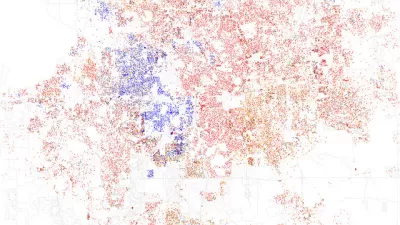Even in liberal states like California, government-sanctioned residential segregation persisted in the 20th century. In a recent talk in L.A., Richard Rothstein, author of The Color of Law, charged planners with undoing this shameful legacy.

"Rothstein's 2017 book The Color of Law, which he discussed at last Friday’s UCLA Extension Land Use Law and Planning Conference, argues that many of the de facto reasons for residential segregation in the United States were in fact de jure reasons. Actual laws and policies passed and implemented by cities, states, and the federal government, not to mention homeowners association bylaws that were often legally sanctioned, prevented African-Americans from living among whites in cities across the country, California included."
"Rothstein attributes this discrepancy largely to African-Americans' former inability to buy homes (or at least to buy homes that appreciated as much as those of their white counterparts). Beyond family economics, Rothstein said that segregation is 'the cause of most of our serious social problems,' including low educational attainment by African-American children forced into segregated, low-quality schools."
"Urban planners are, of course, the ideal audience for Rothstein: they confront the legacy of segregation on a daily basis and they are in a position to do something about it."
FULL STORY: Undoing the Legacy of Segregation in California

Maui's Vacation Rental Debate Turns Ugly
Verbal attacks, misinformation campaigns and fistfights plague a high-stakes debate to convert thousands of vacation rentals into long-term housing.

Planetizen Federal Action Tracker
A weekly monitor of how Trump’s orders and actions are impacting planners and planning in America.

In Urban Planning, AI Prompting Could be the New Design Thinking
Creativity has long been key to great urban design. What if we see AI as our new creative partner?

King County Supportive Housing Program Offers Hope for Unhoused Residents
The county is taking a ‘Housing First’ approach that prioritizes getting people into housing, then offering wraparound supportive services.

Researchers Use AI to Get Clearer Picture of US Housing
Analysts are using artificial intelligence to supercharge their research by allowing them to comb through data faster. Though these AI tools can be error prone, they save time and housing researchers are optimistic about the future.

Making Shared Micromobility More Inclusive
Cities and shared mobility system operators can do more to include people with disabilities in planning and operations, per a new report.
Urban Design for Planners 1: Software Tools
This six-course series explores essential urban design concepts using open source software and equips planners with the tools they need to participate fully in the urban design process.
Planning for Universal Design
Learn the tools for implementing Universal Design in planning regulations.
planning NEXT
Appalachian Highlands Housing Partners
Gallatin County Department of Planning & Community Development
Mpact (founded as Rail~Volution)
City of Camden Redevelopment Agency
City of Astoria
City of Portland
City of Laramie





























